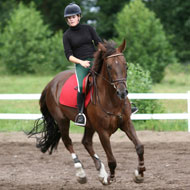Equine organisations launch Manifesto for Horses

An estimated 3.5 million riders were inspired to take up horse sport by the London Olympic Games.
The Equine Sector Council for Health and Welfare and the British Horse Industry Confederation have teamed-up to produce a Manifesto for the Horse for the 2015 General Election.
The manifesto sets out measures to improve the health and welfare of horses, safeguard and expand the equine industry, and increase participation in horse sports.
Each year, the UK equine industry contributes around £7 billion to the economy. With around one million horses in the UK, the industry has a gross output of £3.8 billion a year and provides full time employment of about 200,000, many of which are in rural areas.
According to statistics released by the National Equine Database, an estimated 3.5 million people in Britain rode in 2010-11 and were further inspired to take up horse sport by the 2012 London Olympic Games.
The British Horse Industry Confederation say that horse sports engage a higher proportion than other sports of people with disabilities, women participants and participants over the age of 45, and nearly 40 per cent of those taking part do not participate in any other forms of physical activity.
The British Horse Society (BHS) are urging horse owners and riders to write to their local parliamentary candidates to highlight the importance of policies which support the development of the equestrian sector and protect the health and welfare of all horses in the UK.
BHS chief executive Lynn Petersen said: "By writing to your MP you can help to put horses at the top of the agenda for the 2015 General Election. You can make your MP aware of the issues facing the equine industry and the actions that need to be taken to enhance the health and welfare of one million horses, ponies and donkeys in the UK, increase access to the benefits of riding for all and support equine-related trade and businesses."
To download the 2015 General Election Manifesto for the Horse please click here.



 The Federation of Independent Veterinary Practices (FIVP) has announced a third season of its podcast, Practice Matters.
The Federation of Independent Veterinary Practices (FIVP) has announced a third season of its podcast, Practice Matters.